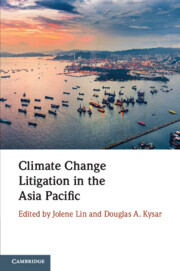Book contents
- Climate Change Litigation in the Asia Pacific
- Climate Change Litigation in the Asia Pacific
- Copyright page
- Contents
- Figures
- Tables
- Contributors
- Foreword
- Abbreviations
- Introduction
- Part I Theoretical Underpinnings and Implications of Climate Change Litigation
- 1 Uncommon Law: Judging in the Anthropocene
- 2 Networked Public Interest Litigation: A Novel Framework for Climate Claims?
- Part II International Law and International Adjudication
- Part III Domestic Law and Domestic Adjudication
- Part IV China, Courts and Climate Change
- Index
2 - Networked Public Interest Litigation: A Novel Framework for Climate Claims?
from Part I - Theoretical Underpinnings and Implications of Climate Change Litigation
Published online by Cambridge University Press: 06 November 2020
- Climate Change Litigation in the Asia Pacific
- Climate Change Litigation in the Asia Pacific
- Copyright page
- Contents
- Figures
- Tables
- Contributors
- Foreword
- Abbreviations
- Introduction
- Part I Theoretical Underpinnings and Implications of Climate Change Litigation
- 1 Uncommon Law: Judging in the Anthropocene
- 2 Networked Public Interest Litigation: A Novel Framework for Climate Claims?
- Part II International Law and International Adjudication
- Part III Domestic Law and Domestic Adjudication
- Part IV China, Courts and Climate Change
- Index
Summary
The globalisation of public interest litigation has caused new forms of democratic lawmaking to emerge. These recent legal actions have altered the manner in which the courts, citizens and advocacy groups interact. Ordinary citizens, despite their nominal remoteness from international decision-making processes, now undertake a significant role in climate governance in and outside of courts. Coupled with the rise of advocacy networks, which bring together state actors and civil society to provide information, personnel and other resources to domestic actors, the emergent properties of recent legal actions warrant a reappraisal of how climate activism and legal activism interact.Using Guinier and Torres’s conception of demosprudence, this chapter inquires whether citizens mobilised towards climate justice are engaged in new forms of democratic lawmaking. In this regard, the international spread of public interest litigation offers a brief example of how demosprudence reconfigures this process and proceeds to frame contemporary climate change activism in the context of social science scholarship on transnational networks. Finally, transnational law and climate change is analysed for insights, utilising crowdfunding and crowdsourcing as case studies.
Keywords
- Type
- Chapter
- Information
- Climate Change Litigation in the Asia Pacific , pp. 38 - 70Publisher: Cambridge University PressPrint publication year: 2020

